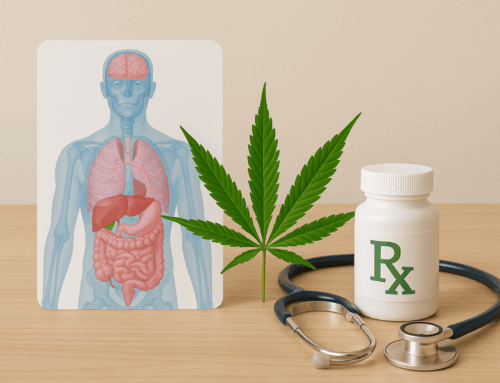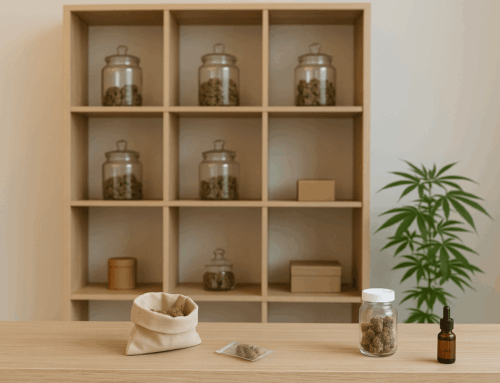As medical marijuana is being embraced more and more across the United States, additional families are thinking of it as a potential remedy for their grandparents. For elderly patients with chronic pain, arthritis, Parkinson’s, and other serious health issues, medical marijuana for parents can be a helpful option when other medications do not work. However, the rules and details of the marijuana industry can be confusing, especially when trying to help a family member.
One issue that seems to bother adult children the most is : Am I able to go and pick up medical marijuana for parents? The reality is, there might not be a clear answer. Even though your approach seems benevolent and logical, cannabis laws are very rigid, and a lack of the appropriate measures may result in tragic outcomes.
This blog post will help you understand the legal requirements for patients, the rules for caregivers, and the steps needed to get medical marijuana for parents. You will learn what must be done to stay compliant and provide support.
Medical Marijuana Laws Explained
Most U.S. states have legalized medical marijuana. Still, each state has its laws on who qualifies, how it is dispensed, and who can handle marijuana. These rules must be followed, especially when trying to procure cannabis for a parent.
How the Laws Vary by State
Cannabis is illegal on a federal level, but individual states have enacted their medical marijuana laws. At this moment in time, over 35 states permit some form of medical marijuana. However, the specifics are different for each state:
Criteria for eligibility differ across states (for example, some states permit cannabis use for anxiety or PTSD while others do not).
Some states require patients to sign up with a centralized health department.
The rules regarding legal assistance to the patient and the caregivers are also state-specific.
Take California as an example: Registrars must be designated caregivers to access the patients. In Florida, caregivers must undergo a background check. In New York, caregivers must be registry users.
Always verify information before taking any steps. Visit your state’s cannabis control board or the health department’s site for relevant links to regional laws.
Who Can Be Considered a Medical Marijuana Patient?
Elderly parents might be eligible to receive medical marijuana if the following prerequisites apply:
- Chronic pain
- Cancer
- Glaucoma
- Alzheimer’s disease
- Parkinson’s disease
- Multiple sclerosis
- Arthritis
- Insomnia or advanced sleep disorders
- Post-traumatic stress disorder (PTSD)
Most U.S. jurisdictions require patients to be evaluated by a qualified physician and provided a medical marijuana card.
Medical Marijuana for Parents Legal Aspects
Simply looking after your parents’ health by managing their medications, going with them to medical appointments, and helping them move about does not, in most jurisdictions, allow you to handle their cannabis. You legally must be designated a caregiver to transport cannabis for them in most states.
How Would One Define Medical Marijuana Caregivers?
A caregiver is someone assigned to handle the logistics for acquiring and moving marijuana for a cannabis card holder and, in some situations, administer the drug. States offer recognition to this function and usually have some form of registration to obtain the status.
As a caregiver, you:
- Can legally buy cannabis from licensed dispensing facilities.
- May transport medical marijuana to the patient.
- May assist with dosing or application (topicals, tinctures, etc.).
Like other positions, a caregiver with a duty of care may face legal ramifications. Imagine the scenario where you are not registered as a caregiver, but you possess marijuana. In that case, you could face legal repercussions or civil fines even if you intended to assist.
How to Register as a Caregiver?
Registration usually entails:
- Filling out an application with the state’s medical marijuana program.
- Submission of identification, such as a driving license or passport.
- Passing vetting procedures.
- Being associated with the patient’s medical marijuana account.
- Paying any associated fees if they exist.
In some jurisdictions, a caregiver card or certificate is sent to you. This is required when buying marijuana on the parents’ behalf.
Always bear in mind the fact that this position is not permanent. You might have to renew your registration annually or after a designated timeframe.
Practical Steps to Pick Up Medical Marijuana
Obtaining cannabis for the elderly parent becomes fairly simple after being registered as a caregiver. That said, each process step must be completed to stay compliant.
Step 1: Search for a Licensed Dispensary
Search your state’s cannabis regulatory site to find out if any dispensaries are authorized to sell medical marijuana. Also, the internet has directories that show places based on their services.
Check the dispensary’s:
- Operating hours
- Accepted payment methods (many are cash only)
- COVID policies or ID check policies)
- Availability of specific products (oftentimes you can call ahead)
Step 2: Assemble the Needed Documents
When you visit the dispensary, ensure you carry the following documents:
- Your caregiver identification card (if issued)
- A copy of your parents’ medical marijuana card
- List products or conditions your parent needs to attend to
- For some dispensaries, you should register the caregiver and patient in their system. A quick call beforehand can save time.
Step 3: Talk to Staff at the Dispensary
Most dispensaries have staff called budtenders, who understand how to assist patients and caregivers in selecting fitting cannabis products. Tell them your parents’ age, regardless of their age and cannabis usage, health condition, and other details.
Discuss:
- Low-THC, high-CBD products for beginners.
- Non-smoking forms like tinctures, edibles, or creams.
- Reliable dosage products designed for older people.
- For seniors new to cannabis, the best approach is low doses, to begin with, and gradual increases if necessary.
Step 4: Transport and Store Safely
After purchasing:
- Please do not remove it from the package.
- It is best to keep it in the boot of your vehicle.
- Store it away from children and unauthorized individuals.
- Adhere to the outlined instructions.
- Stay informed concerning your state’s transportation and storage regulations.
Tips for Supporting Your Elderly Parent
Providing medical marijuana care for your elderly parent is more than a legal matter, as it is a caregiving role that can greatly enhance the well-being of the parent.
Here are a few practical tips:
- Discuss symptoms and how they feel after using cannabis.
- Maintain a log with usage information to guide future purchases.
- Please encourage them to follow through with their advised doctor appointments and medical assessments.
- Research the cannabis products and their side effects, especially concerning any medications taken.
- Being informed and supportive is very helpful in aiding how the parent utilizes cannabis.
Conclusion
The procedure remains within legal boundaries. In most states, you need to register as a designated caregiver. Your parent must hold a valid medical cannabis card. Remember to bring the necessary documents when visiting dispensaries. Communicate effectively with the dispensary staff to ensure you receive the appropriate assistance. Be mindful of your state’s legal limits regarding transportation and possession. By following these steps, you can support your parents’ health needs while ensuring your legal safety. With everything in order, you can confidently help your senior parent access safe and effective cannabis treatment.
FAQs
Can I get a Medical Marijuana Card online for my parents?
Yes, in many states, including Mississippi, you can apply for a Medical Marijuana Card online for your parents if you're their registered caregiver. The process usually involves submitting medical records, an ID, and caregiver information on the state’s health department website.
What’s the right Medical Marijuana dosage for elderly patients?
The right Medical Marijuana dosage varies based on the condition, age, and tolerance level of the patient. For elderly individuals, especially those new to cannabis, it's best to start with low doses—particularly with high-CBD, low-THC products—and adjust gradually under a doctor’s supervision.
How is Medical Marijuana used in managing chronic pain or AIDS in seniors?
Medical Marijuana for chronic pain and Medical Marijuana in managing AIDS is commonly used to reduce inflammation, nerve pain, and appetite loss. It can provide relief when traditional medications fail, especially in seniors dealing with severe or persistent conditions.
Can caregivers use hemp-based products instead of THC for their parents?
Yes, hemp products that contain CBD and minimal THC (under 0.3%) are federally legal and may help with mild pain, anxiety, or sleep issues. However, for stronger relief, especially for chronic conditions, full-spectrum cannabis products might be more effective—pending state law and physician approval.
What are the legal steps for using Medical Marijuana in Mississippi as a caregiver?
To legally obtain Medical Marijuana in Mississippi for a parent, you must register as their caregiver with the state’s program. Both you and your parent must meet eligibility criteria, and you must follow Mississippi’s dosage and possession limits closely to remain compliant.





